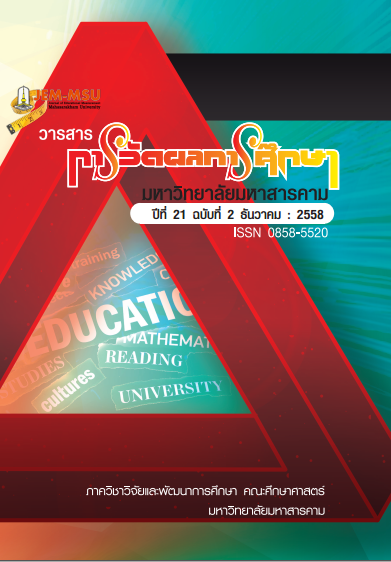A Study of Factors of Early Childhood’s Five Minds for the Future
Main Article Content
Abstract
This research aimed to study of factors of early childhood’s five minds for the
future and to verify the consistency between factor structures of early childhood’s five
minds for the future with the empirical data based on Gardner’s (2009) approach. The
samples were 459 kindergarten students (5-6 years old) from schools under Nakhon
Ratchasima Primary Education Service Area Office 1-7, 1st semester, the academic year
2014. The instrument was the scale of early childhood’s five minds for the future with
the inter-rater reliability of .98. The data was then analyzed by a confirmatory factor
analysis (CFA).
The research results showed that:
1) Confirmatory factor analysis method revealed that five factors in the
early childhood’s five minds for the future due to the 45 observed variables were
between .12-.85, and the statistical level of significance was at .05, positively. Ranking
by the factor loading values of .96, .90, .82, .73, and .61, it was found that disciplined
mind revealed the highest value of the entire factor, following by synthesizing mind,
ethical mind, respectful mind, and creating mind, respectively. Also, each factor’s
covariance of early childhood’s five minds for the future showed its percentage of 91,
81, 67, 53, and 37, respectively 2) The appropriate evaluation of the instructional model was revealed that
the chi-square (χ2) was at 653.78, and a degree of freedom (df) 597 was at .05
probability. Goodness of fit index (GFI), adjusted goodness of fit index (AGFI), and
comparative fit index (CFI) were .94, .90, and 1.00, respectively. The standard root mean
square residual (SRMR) were .05, and the root of mean square error of approximation
(RMSEA) was .01, which was closed to zero. This was indicated that the model was
relevant to the empirical data.
Article Details
The content and information contained in the published article in the Journal of Educational Measurement Mahasarakham University represent the opinions and responsibilities of the authors directly. The editorial board of the journal is not necessarily in agreement with or responsible for any of the content.
The articles, data, content, images, etc. that have been published in the Journal of Educational Measurement Mahasarakham University are copyrighted by the journal. If any individual or organization wishes to reproduce or perform any actions involving the entirety or any part of the content, they must obtain written permission from the Journal of Educational Measurement Mahasarakham University.


